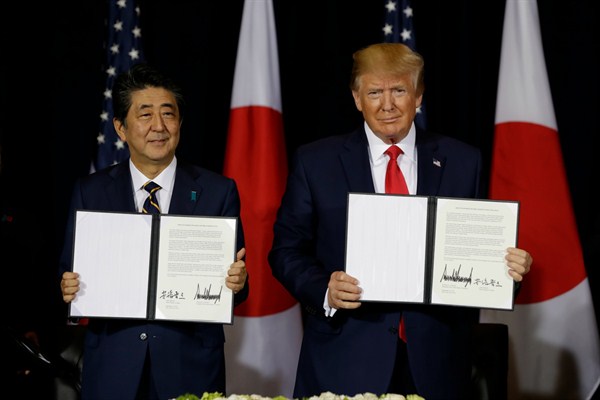A momentous week in which the House of Representatives opened an impeachment inquiry against President Donald Trump overshadowed the announcement in New York that the United States and Japan had reached agreement on a mini trade deal. While its economic impact will be limited, the deal’s implications for the global trading system could be more significant—and not in a good way.
The Trump White House is trumpeting the new U.S.-Japan deal as “phenomenal” and a big win for American farmers, but how big is it really? And is it enough for Japanese Prime Minister Shinzo Abe to sell at home? From the press statements and fact sheets, it appears that the deal will follow the outlines of what Trump and Abe previewed in August at the G-7 summit in Biarritz—except that Abe seems to have mostly caved on his key priority of getting something on automobiles. But key details are still missing because there is still no official text of the agreement.
Based on what is known about the deal, Japan will, as expected, cut its agricultural tariffs largely in line with what it negotiated in the Trans-Pacific Partnership, which Trump took the U.S. out of soon after taking office. In turn, the U.S. will cut its industrial tariffs—but not for cars or car parts, as Abe had wanted. Abe also didn’t get an explicit, written commitment from Trump to exempt Japanese automobile exports from any tariffs imposed on alleged national security grounds under Section 232 of the Trade Expansion Act. In a joint statement, the parties promised only to “refrain from taking measures against the spirit of these agreements.” During the press conference announcing the deal, U.S. Trade Representative Robert Lighthizer said that the president had no intention “at this point” of imposing tariffs on Japanese cars.

